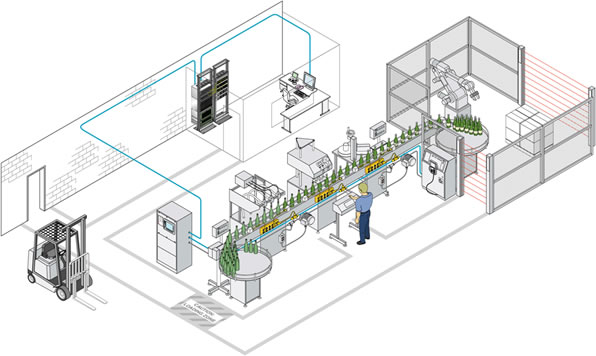Connectors for Automated Process Systems Help Bring Quality Products to Market Faster
By Tom Schoder, Group Product Manager, Molex Industrial Business Unit
Almost every product that people touch in their daily lives is the result of an automated manufacturing process. This includes relatively simple assemblies, such as cereal boxes, shampoo, and luggage, as well as complex assemblies like automobiles.
Consumers rarely consider the technologies required to manufacture all of these products, not to mention the complex processes that ensure they arrive on time and meet consistently high quality levels. Simply stated, automation systems play an enormously important role in ensuring production and fulfillment processes run smoothly so consumers are not left waiting or dissatisfied.

Within the inner workings of these automation systems, industrial connectivity products play an integral role in facilitating the seamless delivery of manufactured goods by helping ensure machines and systems run consistently. To understand just how critical this role is, consider two manufacturing industries on the leading edge of automation technology—automotive and consumer goods.
Enabling Automotive Plant Systems to Withstand Harsh Conditions
Modern automotive plants require complex assembly, machining, and welding. Costs can add up quickly for planned and unplanned production downtime, so machine and component reliability are absolutely critical. Such demanding work environments call not only for robust and durable products, but also for products built to withstand high flex, welding, and chemical exposure.
To take on this challenge, automotive manufacturers require partnerships with global connector suppliers that have the resources to meet the design, build, install, start-up, and maintenance requirements of complex assembly lines and vehicle platforms. Other requirements to keep automation processes running properly include the timely delivery of connector products, technical support, and consistent quality.
Quality connectivity products have assisted automotive firms for decades by reducing the downtime caused by the frequent need to replace mechanical limit switches. The introduction of “plug-and-play” wiring to the industry in the early 1970s greatly improved up-time. Through ingress protection and other reliability testing, manufacturers of connectivity automation products have also helped the industry improve quality control processes to make sure automation process products perform reliably in harsh environments.
Lowering Operating Costs in Consumer Goods Manufacturing Plants
Manufacturing plants for consumer goods — including food and beverage processing, packaging, and consumable packaged goods — present a similarly challenging environment. This sector also requires harsh-duty industrial communications, connectivity, power, and control products.
Key drivers on the plant floor include the demand for increased productivity and reliability, in addition to machine designs that are safe for workers and products. Increasingly, consumers are also concerned with whether or not manufacturer practices promote sustainability and social responsibility.
IP67-rated connectivity products for industrial automation that can handle up to 35 amps are particularly mission-critical to connect all machine functionality on a food and beverage plant floor — from packaging and bottling to processing equipment. By providing advanced connector components with zero-defect product quality, plants can lower maintenance, repair, and operating costs.
Evaluating Connectors That Enhance Automated Manufacturing Processes
Industrial communication products from leading connectivity manufacturers enable automation machines and devices to communicate with each other using a variety of protocols, such as DeviceNet, Ethernet/IP, and Profibus/ProfiNet. When evaluating connectivity products for manufacturing operations — whether connecting power, industrial networks, or automation equipment — look for connectors, cabling and interface cards that are engineered for ruggedness and constructed to provide easy installation. Connectors should also offer long-term, reliable signal and power performance in harsh environments.
Many leading manufactures offer a complete array of required connectivity products, including micro-change and nano-change connectors and cordsets. The micro-change connectors you choose should be able to handle M12 interfaces, such as sensors and I/O junction blocks, while nano-change connectors should conform to M8 connector standards.
Another attribute to seek on both types of connectors is the option of using the threaded or push-on versions. Other key connector attributes to look for:
- Gold-plated, copper-alloy contacts with bronze sockets to ensure reliable, low-resistance performance
- Fast and easy insertion with non-arcing connection points to ensure safe interfaces for instrumentation and control devices that operate in potentially explosive Class I, Division 2 and Zone 2 hazardous areas
- Radial seals to eliminate intermittent signals in harsh environments
- X-code cross-shielding for superior signal integrity
- 10 Gbps Ethernet transmission bandwidth for vision systems and other high-speed data transfer applications
- Reduced footprint size to enable lower installation and cabling costs in process and automation control applications and industrial applications
- Ability to communicate across a multitude of industrial protocols for process control in critical manufacturing and robot control environments
The End Results
By relying on connectors with the attributes described above, automotive and consumer goods, as well as other manufacturing operations, can help ensure their automation systems meet vigorous production, efficiency, and quality standards. This, in turn, will help bring products to consumers faster and at more competitive pricing levels.





